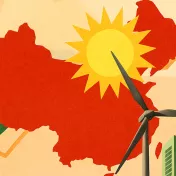Climate policy in Turkey is shaped by the country’s fossil-fuel based energy strategy, while domestic demand for more ambitious climate action is weak. Current energy market dynamics and joint G20 strategies to align markets with the Paris Agreement might, however, provide impetus for change.
Turkey displays similar traits with other emerging economies: Above the global average GDP growth rate, increase in energy demand and GHG emissions, and a yet-to-decouple correlation among these three indicators. Yet, there are discrepancies as well.
Turkey is an OECD country, that has been listed in both Annex I and Annex II of UNFCCC 25 years ago, despite its comparatively low historical responsibility. The country undertook decades-long efforts to shake off this classification. With the COP7 decision to delete its name from Annex II and to differentiate it from other Annex I countries regarding its special circumstances, it partly succeeded.
Paris-Agreement yet to be ratified
After Paris Agreement, we are witnessing the pursuit of a new UNFCCC decision, which will ensure that Turkey will both not be obliged to put an ambitious emission reduction target and secure access to climate funds, bringing the country on equal footing with other emerging economies. In the absence of such a decision, Turkey is one of the two G20 countries yet to ratify the Agreement, alongside Russia.
Its unambitious INDC suggests a 40% rise in the growth rate of emissions between 2010 and 2030 compared to 1990-2010 period, disguised by an officially declared “up to 21%” decrease in emissions compared to business as usual by 2030.
Increase in coal and nuclear energy
Looking at Turkey’s energy policy could unveil the country’s lackluster commitment to climate action. Expansion of domestic coal capacity and introduction of nuclear power have been identified as the primary building blocks of the energy security strategy.
Second in Europe in terms of solar energy potential, and possessing one of the fastest growing wind energy markets in the continent, the country could be a renewable energy powerhouse. It already meets more than 30% of its electricity from renewable energies, but has chosen to keep this percentage intact as its 2023 target.
The introduction of the “Renewable Energy Resource Areas” scheme in 2016 by the Turkish Ministry of Energy could enable large scale renewable power projects, help develop domestic R&D and manufacturing capabilities for renewables. However, it has also introduced dispatch priority and purchase guarantees for existing and planned coal-fired power plants.
The inconsistencies are stark, and Turkey is a country in limbo. Overall, Turkey's climate policy has been predominantly shaped in response to international stimuli, rather than domestic demands. As non-ratification of Paris Agreement highlights, this dynamic has obvious limits, and Turkey's climate policy is increasingly a function of its energy policy.
Could the G20 prove to be a tie-breaker on behalf of more ambition in climate targets? Given how the issue was dealt with during Turkey’s G20 presidency in 2015, the answer is not affirmative. Trump’s decision to withdraw from Paris Agreement does not help, either.
Reasons for optimism
On the other hand, G20-decisions that could help align markets with the Paris Agreement and the 2030 Agenda, such as a strong commitment to phasing out all fossil fuel subsidies by 2020, progressive steps on carbon pricing and adequate disclosure of climate-related financial risks, could encourage the transition in Turkey.
There are other reasons for optimism. Current developments in energy markets indicate a unique opportunity for Turkey to shift away from a carbon lock-in pathway, especially in the power sector. Energy transition could change Turkey’s appetite for emissions, while helping the country attain its energy security objectives, develop a national renewables industry, create decent jobs for its young population and improve public health that is threatened by a potential coal fleet expansion.
Turkey’s climate and energy future will be determined out of the interplay of the burgeoning transition in the global energy system, increasing interest of investors and financiers for renewable energy and unwavering belief and support of policy makers on the importance of base load power and coal for Turkey’s energy system.
What Turkey needs to do is straightforward. Recognize the dynamics of change, shake off its defensive position in climate negotiations, review its energy strategy and INDC, ratify the Paris Agreement and jump on the bandwagon of low carbon transition.
In the aftermath of Trump’s decision to withdraw from Paris Agreement, the G20 summit in Germany presents a unique opportunity for Turkey to assume a more constructive climate policy position and align with other G20 members on ambitious climate and energy targets.
Mustafa Özgür Berke is an independent climate and energy policy consultant. He has worked for WWF-Turkey for over a decade, and currently providing consultancy services for WWF-Turkey and GÜNDER (Turkey Solar Energy Society). Transition of Turkey’s economy to a low-carbon pathway and scaling up renewable energy and energy efficiency in Turkey are priority focus areas in his professional work.
- With financial support by Stiftung Mercator. The Author and Germanwatch are responsible for the content. -





